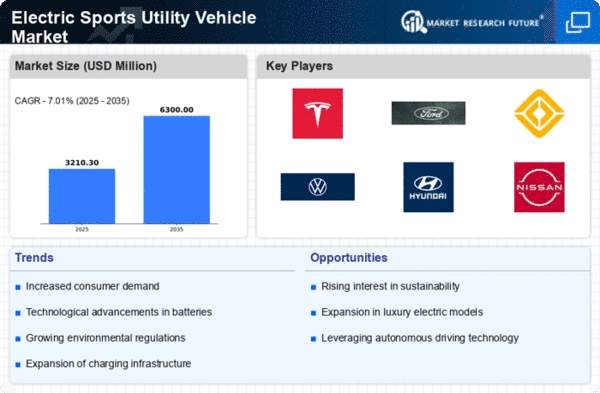Top Industry Leaders in the Electric Sports Utility Vehicle Market
*Disclaimer: List of key companies in no particular order
Top listed global companies in the Electric Sports Utility Vehicle industry are:
Toyota Motor Corporation (Japan), Tesla, Inc. (U.S.), BMW Group (Germany), Jaguar Land Rover (UK), Audi AG (Germany), Porsche AG (Germany), Volvo Car (Sweden), The Hyundai Motor Company (South Korea), Honda Motor Company, Ltd. (Japan), and Nissan Motor Co., Ltd. (Japan).
Bridging the Gap by Exploring the Competitive Landscape of the Electric Sports Utility Vehicle Top Players
The electric sports utility vehicle (e-SUV) market is electrifying, fueled by booming demand for eco-conscious, spacious transportation. competition in this burgeoning space is fierce and dynamic. Let's delve into the key players, their strategies, and the trends shaping this captivating automotive sector.
Key Players and Their Strategies:
- Established Automakers: Legacy brands like Tesla, Audi, Mercedes-Benz, and BMW are leveraging their brand recognition and existing production infrastructure to carve out significant market share. Their focus lies on premium offerings with cutting-edge technology, luxury features, and high performance ranges. For example, Tesla's Model X remains a benchmark, while Audi's e-tron lineup and Mercedes' EQC cater to different luxury segments.
- Emerging Startups: Nimble and innovative startups like Rivian, Lucid Motors, and Nio are challenging established players with bold designs, focus on user experience, and disruptive direct-to-consumer models. Rivian's R1S and R1T blend off-road prowess with luxury, while Lucid Motors' Air Dream Edition delivers stunning performance and range. These players are attracting tech-savvy customers seeking a fresh EV experience.
- Traditional Automakers Embracing EVs: Companies like Volkswagen, Ford, General Motors, and Hyundai are rapidly expanding their e-SUV portfolios to remain relevant. Their strategies involve offering a range of price points and features to cater to broader customer segments. Volkswagen's ID.4, Ford's Mustang Mach-E, and Hyundai's Kona Electric are examples of their aggressive push into the mainstream e-SUV space.
Factors for Market Share Analysis:
- Range and Charging Infrastructure: Battery range anxiety remains a major barrier for potential e-SUV buyers. Players competing on extended range and fast-charging technologies like Tesla's Supercharger network have an edge. Additionally, partnerships with charging infrastructure providers can be decisive.
- Pricing and Incentives: Affordability plays a crucial role in mass adoption. Government incentives and competitive pricing strategies are key differentiators. Brands like Hyundai and Chevrolet are making e-SUVs more accessible with attractive price points, while others like BMW are offering subscription models.
- Technology and Innovation: Cutting-edge features like advanced driver-assistance systems (ADAS), autonomous driving capabilities, and in-car entertainment systems set brands apart. Tesla's Autopilot and General Motors' Super Cruise are examples of such innovations attracting tech-savvy consumers.
- Brand Reputation and Customer Service: Trust and a positive ownership experience are essential for long-term customer loyalty. Legacy brands leverage their established reputation, while startups like Rivian focus on exceptional customer service to build trust.
New and Emerging Trends:
- Focus on Sustainability: Beyond battery technology, players are exploring sustainable materials and manufacturing processes to minimize environmental impact. BMW's use of recycled nylon and Ford's commitment to carbon neutrality are examples of this trend.
- Personalization and Customization: Offering customization options for interiors, exterior appearances, and even software features is gaining traction. Tesla's online configurator and Rivian's partnership with outdoor gear brands are forerunners of this trend.
- Subscription and Shared Mobility Models: E-SUVs might see increased integration with subscription and shared mobility services, catering to changing ownership preferences and urban lifestyles. Startups like Rivian and traditional players like General Motors are exploring such models.
Overall Competitive Scenario:
The e-SUV market is a dynamic battleground where established automakers, nimble startups, and traditional players with aggressive EV strategies collide. Competition is fierce, driving innovation, diversification, and a focus on customer needs. Range, affordability, technology, and brand experience are key battlegrounds. New trends like sustainability, personalization, and alternative ownership models further add complexity and excitement to the scene. As the market matures, expect consolidation, strategic partnerships, and a relentless pursuit of differentiation to shape the future of e-SUVs.
Latest Company Updates:
Toyota doubles down on hybrid bet in India: The company plans to release a new hybrid SUV in India later in 2023 or early 2024. This move reflects Toyota's strategy of adapting to different market preferences and regulations. (Source: The Economic Times, July 26, 2023)
Tesla, Inc. (U.S.): Model X Plaid refresh announced: Tesla is expected to unveil a refreshed Model X Plaid with improved performance and range in January 2024. (Source: Electrek, October 26, 2023)
BMW Group (Germany): iX Flow with E Ink technology showcased: BMW presented a concept iX SUV with E Ink technology that allows for dynamic exterior color changes. (Source: The Verge, January 4, 2024)

